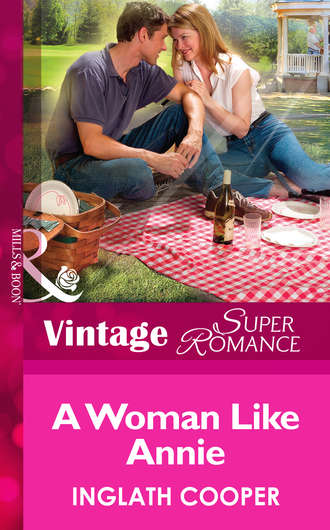
Полная версия
A Woman Like Annie
The man wasn’t facing the door. Annie had no idea what he looked like. “Maybe.”
Charlotte shook her head and said, “No wonder you didn’t mind taking over as mayor, Annie. If this is the kind of thing you get to do, I might just run myself next term.” A big wink followed the assertion.
Not trusting herself to respond, Annie put a hand on Tommy’s shoulder and steered him toward the back of the restaurant, waving at familiar faces as she wound her way through the tables.
She stopped at the booth Charlotte had pointed out. “Mr. Corbin?”
The man stood. “Mayor McCabe?”
Annie nodded, momentarily struck mute. Charlotte Turner might need sensitivity training when it came to little boys, but she was right on this. Annie would never have put a face this good-looking on a man who was about to do to Macon’s Point what this one was about to do. In her mind’s eye, she’d penciled in something much more weasel-like, sinister, even. And, yes, he did look like the kind of guy who would drive a black Porsche, or closer still, head up the ad campaign for one. He had dark brown hair and the kind of lean, high-cheekboned face that spoke of good genetics and an athletic lifestyle. “I, ah, I hope you don’t mind, but my son Tommy is joining us for dinner. Tommy, this is Mr. Corbin.”
“H’lo,” Tommy said, staring at the man with open curiosity.
“Hello, Tommy,” he said, looking, to his credit, only a little taken aback. “It’s nice to meet you.”
“We had a little emergency at home,” Annie said, “and I didn’t have time to get him to the sitter’s.”
“Nothing serious, I hope?”
She shook her head. “Oh, no. Just a St. Bernard, a chocolate cake and a trip to the vet’s.”
He nodded as if he understood, but Annie suspected she might as well have spouted off a paragraph of Greek for all he would understand of that. Her own life was an unending series of such events, and for one un-maternal moment, she wondered what it would be like to have arrived on time with her hair dry and all her buttons in place.
“May I take your coat?” he asked.
“Thank you,” she said, feeling a little awkward as she slipped her arms free of the heavy garment and then helped Tommy slip out of his. He took both coats and hung them on the rack a few feet from their table.
“Please, sit down,” he said. “I went ahead and ordered some iced tea. May I ask the waitress to bring you both something?”
His manners surprised her. J.D. had been used to having other people scurry to do things for him, open a door, “Take your coat, Mr. McCabe?” As for Annie, she’d gotten used to doing things for herself. Hanging up her own coat. Ordering her own drink.
“Your tea looks good, actually.”
“Can I have hot choc’late?” Tommy piped in.
“May you have hot chocolate,” Annie automatically corrected. “And yes, you may.”
“One iced tea and one hot chocolate coming right up,” Jack Corbin said and went off to tell the waitress. Annie helped Tommy climb onto the booth seat, waited while he scooted toward the wall, then sat down herself.
Corbin was back in less than a minute, sliding into the other side of the booth. Before Annie could say a word, Tommy raised his gaze from his Nintendo game and said, “We’re gonna talk bizness.”
Unexpected though it was, the comment served as an effective icebreaker. The man across the table smiled and said, “So we are, but why don’t we order our dinner first?” He pulled three menus from the stand next to the wall and handed one to them.
“I can’t read,” Tommy said, but appeared impressed that it had been assumed he could.
“Maybe your mom can take a look at it then.”
“Sure, honey,” Annie said, anxious to decide on something so she could focus on her speech. “Let’s find something you’ll like. How about the macaroni and cheese?”
“Uh-uh.”
Annie ran her finger down the list of tonight’s specials. “Mashed potatoes?”
Tommy shook his head again, this time with more emphasis.
“A hamburger?”
Another headshake.
“How about some soup?”
“No.”
Annie heard the dissatisfaction in her son’s voice, recognizing where it was headed. For the most part, Tommy was an angel of a child. But ever since J.D. had left, temper tantrums had become a way of life. There was no predicting them, and Tommy’s counselor had told her that she should simply let them run their course, that they were the boy’s way of punishing her for the changes since his father had left. Another notch on life’s belt of unfairness since J.D. had made that decision all by himself, without any help from her.
“Okay,” she said in a reasoning tone, praying that she could head this off, “how about a grilled cheese?”
“No,” he said, his voice growing louder.
This was not going at all as planned. Sitting across from her was the man who held the fate of this town in the palm of his hand. Annie figured she had one chance and one chance only to get him to at least consider not selling Corbin Manufacturing, and how on earth was she going to do that with Tommy throwing a fit beside her?
“You know what my favorite thing here was when I was your age, Tommy?” Corbin’s question was casual.
Tommy looked up, no doubt intrigued that a man as big as the one sitting in front of them could ever have been his age. “What?”
“Pancakes.”
“For supper?”
“For anytime. In fact, I think that’s what I’ll have tonight.”
Tommy pondered that for a moment, then looked at Annie and said, “Can I get pancakes, Mama?”
“May you have them. And yes, you may,” Annie said. In another less-than-admirable motherhood moment, she would have let him order jelly beans if that’s what it took to head off the storm about to erupt.
Tommy went back to his game, his bad mood dissipating as quickly as it had started.
Annie breathed a silent sigh of relief. “Thank you for your patience, Mr. Corbin. I realize this isn’t what—”
“It’s Jack. And this is fine.”
Jack, then. His response wasn’t the one she would have expected. Her own self-painted portrait of Jack Corbin, playboy extraordinaire, did not include the ability to deter little boys from temper tantrums with the finesse of a conductor leading an orchestra through Beethoven’s Fifth. Guys who drove Porsches didn’t do that, did they?
Charlotte appeared then with their drinks, an iced tea for Annie and a hot chocolate with an extra bowl of marshmallows on the side for Tommy.
“Another of your favorites?” Annie asked, surprised and more than a little appreciative.
“Hot chocolate’s nothing without the marshmallows.”
Annie had no doubt that Jack Corbin had just moved up another level in Tommy’s estimation. Next to chocolate cake, marshmallows ruled.
“Careful now. It’s hot,” Annie warned while Tommy filled the cup with as many of the gooey treats as it would hold.
“What can I get for you?” Charlotte asked. “I’ll take you first, Mayor.”
Food was the last thing Annie wanted, so she said the first thing that came to mind. “A tossed salad, please. Thousand island on the side.”
“All right.” Charlotte scribbled on her pad. “And the gentlemen?”
“We’re having pancakes,” Jack Corbin said as seriously as if he’d just ordered the two of them the best steaks on the menu.
Tommy beamed.
Charlotte looked at Annie and said, “Unpredictable, too? Two stacks of pancakes coming right up.”
As soon as she’d headed off toward the kitchen with their order, Tommy said, “Do people always get to order pancakes when they talk about bizness?”
“Not always,” Jack said. “But I’d have to say it’s a pretty good idea.”
Annie smiled and smoothed down a wayward strand of Tommy’s hair. Her son had managed to defuse some of the nervousness she would have no doubt been feeling had she been here alone with Jack Corbin. She’d been lucky to get the man to meet her at all, and she couldn’t afford to waste any more of the limited time she had to make her case.
“Jack.” She cleared her throat and willed her nerves to settle. “I know I mentioned this in my letters and calls to your attorney—”
“All of them?” he interrupted.
Was he teasing her? The thought tripped her up a bit. “Ah, yes, I’m sure. I would like to reiterate again just how much Macon’s Point would like to see Corbin Manufacturing remain in business. A great many of the people who live here rely on your factory for their—”
“My daddy’s famous.”
The announcement came from Tommy who had looked up from his game and was waiting for a reaction.
“He is?” Jack asked with a raised eyebrow. “What’s he do?”
“He plays baseball.”
“Tommy, honey, Mr. Corbin and I are discussing—”
“For what team?”
“He used to be with the Braves, but he got hurt.”
“Is your daddy J. D. McCabe?”
Tommy nodded, so proud that Annie’s heart hurt.
“He is famous,” Jack said, looking impressed enough to make Tommy light up again. “He’s quite a player.”
“I want to be just like him when I get big. He lives in Los—” Tommy hesitated and then looked up at Annie. “Where is it, Mama?”
“Los Angeles, honey.”
“Mama and Daddy are divorced, so he has to live out there.”
“Oh,” Jack said, the response admirably neutral.
Annie drew in a quick breath, put a hand on her son’s hair and said, “Tommy, we’ll have to tell Mr. Corbin about Daddy’s baseball career another time. We can’t keep him here all night, and he and I have some very important things to discuss.”
“Do you like baseball, Mr. Corbin?” Tommy asked, completely ignoring Annie’s attempt at reason.
“I like to watch it, but I never was very good at playing it.”
Tommy considered this for a moment, and then said, “Not everybody can be a great baseball player.”
Annie recognized the words her son had used in an attempt to console Jack. They were the same ones she’d used since Tommy had first started asking her if she thought he’d grow up to be a great baseball player like his father. One of her greatest fears was that Tommy would hinge his sense of self-worth on whether or not he could play like J.D., and this was the last thing she wanted for him. “Tommy, honey—”
“You’re right about that,” Jack said. “Everyone is born with different strengths and abilities.”
Tommy considered this for a brief moment. “What’s yours?”
Jack rubbed a hand around the back of his neck and said, “Hmm. I guess I would say I might have a talent for putting things back together again.”
Annie could see that the comment was as intriguing to her six-year-old son as it was to her.
“Like puzzles?” Tommy asked.
“Sort of, but with real-life situations.”
“Oh.”
Tommy let it go, and for once Annie wished her son would persist with another question.
Charlotte appeared with their dinners.
“Let’s see, one tossed salad for our mayor,” she said, placing the bowl of lettuce and vegetables in front of Annie. “And for our boys, pancakes.”
She set the loaded plates in front of “the boys,” bestowing a there-you-are-sugar on Tommy and then landing a what-do-you-say-we-meet-up-later smile on Jack Corbin.
“Mama, will you cut up my pancakes?”
“Sure, honey.” Annie darted a glance at Jack who was waiting politely for the two of them to begin eating. “Go ahead, please,” she said.
He reached for the syrup bottle and poured liberally until his plate was a pond with the pancakes floating in the center like a stack of lily pads.
“Can I have as much syrup as Mr. Corbin, Mama?”
Annie tried not to smile. “I’ll pour, and you say when, okay?”
Jack passed the syrup bottle to her with a slightly embarrassed shrug, which startled her with its unexpected appeal. “Okay, so in some ways, a man never grows up.”
“In most ways,” Annie said, the remark slipping out before she had given it an edit.
He cocked an eyebrow and passed up commenting on that, but Annie didn’t miss the curiosity in his eyes.
After finishing with Tommy’s pancakes, Annie drizzled dressing across her salad, took a few token bites and then put down her fork, feeling as if the lettuce were sticking in her throat. The sooner she said what she’d come to say, the sooner the knot of nerves inside her would dissolve. “As I was saying, Jack—” She stopped, cleared her throat, then tried again. “Five hundred people in this town will be out of work if you close down your factory. That means they won’t be able to pay their mortgages or car payments. They will be without health insurance. If you shut down that factory, you might as well shut down the whole town.”
She’d gained momentum near the end, strong and not a little accusatory. Annie happened to believe that every word she had just said was true, and she somehow needed to make him understand that. “There must be something that can be done. It’s not as if the company is in bankruptcy.”
Jack Corbin studied her for several long seconds. Annie resisted the distinct urge to fidget under that level stare and remained still in her seat. It was the most intimidating stare she’d ever faced in her life. Don’t look away, Annie. If you do, he wins.
“Close enough,” he said, a glimmer of respect in his eyes when he said, “Look, Mrs. McCabe—”
“Annie.”
“Annie,” he inclined his head, “I appreciate your position. And I’m sorry that things have ended this way. My father’s company provided the people of this town with livelihoods for a lot of years. But he’s not here anymore. And Corbin Manufacturing was his vision, not mine.”
Annie’s heart sank. As explanations went, his sounded as if it had been forged in steel. The set look to his jaw told her that she didn’t have an icicle’s chance in Tahiti of turning this particular situation around. She suddenly felt tired and resigned and downright sad.
Some combination of those emotions must have been reflected in her face. He sighed and said, “Look, I appreciate the difficulty of your position, Annie. I hope you can do the same of mine.”
Annie toyed with a piece of lettuce at the edge of her bowl, avoiding his gaze. She looked up then and met it head on. “Actually, I can’t. You see, I know most of these people as individuals. I know Sam Crawford who works in your finishing department. He has a wife with MS and three children he’s somehow managing to raise while working and taking care of her. I know Milly Thomsen who works in the front office. She’s supporting herself and twin girls after her husband was killed in a logging accident last year. I see the individual tragedies that will happen in this town if that factory closes down, and no, I can’t accept the rightness of that. Not if there’s any way at all to avoid it.”
Tommy’s heels thunked against the lower panel of the booth. “I’m sleepy, Mama. Are you done talkin’ bizness?”
“I think we’re just about finished, Tommy,” Jack said, shifting his unreadable gaze from Annie to her son who was rubbing his eyes with the back of a fist.
Annie put an arm around Tommy’s shoulders, her heavy heart dropping a few more inches. “Thank you for listening. I only wish I could have said something to make you reconsider.”
She got up from the booth then, pulled her wallet from her purse and put a twenty on the table. “Let’s go home, Tommy.”
Tommy blinked with sleepy eyes and said, “You didn’t eat all your pancakes, Mr. Corbin.”
Jack got up and stood politely to the side. “No, I didn’t. I wasn’t as hungry as I thought.”
“Well, we’ll be going,” Annie said stiffly, taking Tommy’s hand.
“Good night,” Tommy said.
“Nice to meet you, Tommy.”
“Good night,” Annie said. She led her son back through the restaurant, the weight of failure heavy on her shoulders.
AFTER LEAVING WALKER’S, Jack followed South Main out of town, winding through the September night, leaving his window cracked to reacquaint himself with the smells of the country. Burning leaves in the front yard of what had once been the old Jefferson house. Corn silage at Saul’s Dairy.
He traveled the last two miles of the secondary road that led to Glenn Hall behind a seen-better-days Ford pickup with a missing taillight and a lopsided bumper, the right side of which nearly touched the pavement every time the driver tapped his brakes.
For once, Jack didn’t mind the pace. His regular life revolved around being in a hurry. Last-minute trips. Nearly-missed planes. A new city every week. He’d set his life up that way, and most of the time, it suited him just fine. Slowing down gave a man too much time to think, often enough about things that didn’t bear up under scrutiny. Like where he’d been instead of where he was going. That he couldn’t go back and erase tracks he’d already made. All he could do was point his feet in another direction next time out.
Jack hated letting people down, and it seemed as if lately he’d become an expert at it.
He’d certainly let Annie McCabe down tonight. And he felt like a heel.
Okay, so maybe it hadn’t been as easy as he’d expected it to be. Saying no to a woman with eyes the color of Swiss chocolate and a little boy at her side. It had been the most unconventional business meeting Jack had ever attended.
He didn’t know what he’d expected in Annie, maybe forty-five and frumpy. Nix that image. She was cute like a Meg Ryan where a first glance says, hmm, nice. Second glance, very nice.
She had the kind of mouth that got him distracted fast. Full lower lip which she worried with even, white teeth in between the arguments she’d been launching at him with fastball accuracy.
And she’d been married to J. D. McCabe. J.D. had been a couple years older than Jack. Jack had gone to a private school, so their paths rarely crossed. But he remembered J.D. as a guy with a laser-beam smile and more than his share of confidence. He wondered why the idea of Annie with him didn’t quite gel.
The truck in front of him slowed to a crawl, then angled right and rolled off down a gravel driveway, freeing up the road. Jack nudged the accelerator to the floor, suddenly anxious to knock out each of the obligations standing between him and tying up for good these last connections to Macon’s Point.
The Porsche raced up the next hill, rounded a curve, and there it was. Glenn Hall. The car’s headlights arced across two enormous fieldstone columns marking the entrance to the farm his father had left to Daphne Corbin, his second wife. Now Jack’s by default.
He stopped and got out to open the gate with the key his attorney had sent him. He swung the gate arms wide. A three-quarter moon backlit a white four-rail fence in need of paint. Standing beneath an old maple some twenty feet inside the pasture were two big Percheron horses gazing at him with open curiosity.
Jack ducked back inside the Porsche and found two pieces of peppermint candy in the glove compartment. He crossed the driveway to the fence. One of the horses nickered and ambled over.
“Hey, Sam,” Jack said, unwrapping the candy and giving it to him. “Still the brave one, I see.”
The other horse edged up beside them, not quite as courageous, but unwilling to be left out. “Hey, Ned, old boy.” Jack gave him the candy and rubbed his forehead. Both horses stood there, crunching their candy and sniffing Jack’s arm.
Just the sight of them cut off the air in his lungs, flooding him with vivid memories of his father. Hooking up the team on a Sunday afternoon, taking Jack and his mother for a wagon ride down the old country roads surrounding the farm. To most people, this side of Joshua Corbin had never meshed with the image of a CEO whose business provided a big percentage of the town’s jobs. But to Jack, it had. As a little boy, it was seeing his father drive those gigantic horses that had made his heart swell with pride, made him want to tell the world that was his father up there. He’d taught Jack a lot about life through those horses. How to care for things that depended on you. That a soft voice brought about the desire to please in a way a harsh hand never could.
They were old now. In their late twenties at least. There had been four at one time. He threw a glance across the pasture behind him. If the other two had been out there grazing, they would have made their way to the fence already. He was surprised any of them were still alive, more so that Daphne hadn’t sold them all long ago. He almost wished she had just so he didn’t have to.
Sam and Ned had spent their entire lives here. He’d find a good home for them, but that didn’t make him feel any better.
He gave them a last rub, got back in the car and followed the winding driveway to the house that sat on a slight rise some quarter mile away. From the outside, at least, nothing had changed. The house had been built from fieldstone. White wooden shutters bracketed each window. An enormous mahogany door marked the center entrance. Jack’s father had built it for his mother, the two of them using an old pickup on weekends to load up the rock for the house from the edges of the fields on the farm. It was she who should have lived here all these years. She who should have left it to him. Not Daphne.
He got out, leaving the couple of bags he’d brought with him in the back of the car.
Jack pulled the key from his pocket and opened the front door. He’d expected to be greeted with the musty scent of neglect. Instead, the house smelled clean, fresh, as if someone had just been through with a bottle of lemon Pledge and a bucket of soapy water.
Jack flicked on a light, then stood in the hallway, giving himself a moment to acquaint memory with reality. He ventured down the front hallway, his footsteps echoing around him. It was a sad, no-one-lives-here sound that did not fit his memories of a childhood rich with all the things that make a house a home. Warm cooking smells. Winter evenings spent in front of a crackling fire. Summer afternoons on the back porch drinking lemonade.
The memories stung.
“Jack?”
He swung around, and there in the doorway stood Essie Poindexter. Rounder than he remembered. But with the same smile that connected in a straight line from her mouth to her eyes.
Emotion had a lock on his throat. “Essie,” he finally said.
“Land’s sake, I can’t believe it’s really you, son.”
They stepped forward at the same time, meeting halfway across the room in a fierce hug, he towering over her short, stout frame, she with her chubby arms locked tight about his waist.
When he finally pulled back, tears marked her round cheeks. He reached out and rubbed them away with his thumbs. She hadn’t changed much, a few more lines in her face, maybe, softened, though, by the warm welcome there. The sight of her deluged him with reminders of a childhood in which she had played a more-than-significant part. For as long as he could remember, she had lived in a house his father had built for her at one end of the farm. She’d been hired as a housekeeper to help out Jack’s mother, but Jack had always thought of her as family.
“I saw lights coming up the driveway and figured I better see who it was. Thought you could slip in without seeing old Essie, huh?” she asked, the hurt behind the question barely concealed.
He pulled her against his chest again and rubbed her slightly humped back with the palm of his hand. “Of course I was coming to see you, Es.”
“I’d say it’s about time,” she said, pulling away to squint up at him. She stepped farther back and took a longer look. “I remember your father at thirty-three. You look just like him. Handsome as the day is long. I just wish you two had mended your fences.”
He held up a hand. “Essie, don’t, okay?”
“I expected to see you here for the funeral, son,” she said, her words colored with equal doses of admonishment and disappointment. “I know you never got to know her, but she was your stepmother. She was sick for a good while.”
“I didn’t know. But I’m sorry about it, Essie. I was out of the country when it happened. I didn’t receive word until the day after the funeral. Besides, I wouldn’t have belonged there, anyway.”








